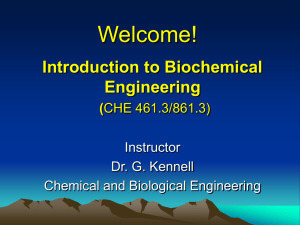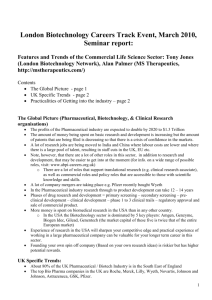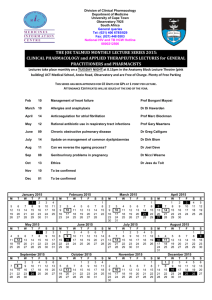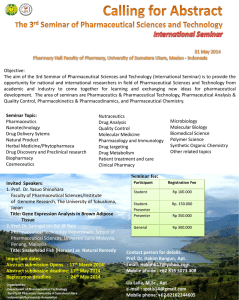Module Handbook
advertisement
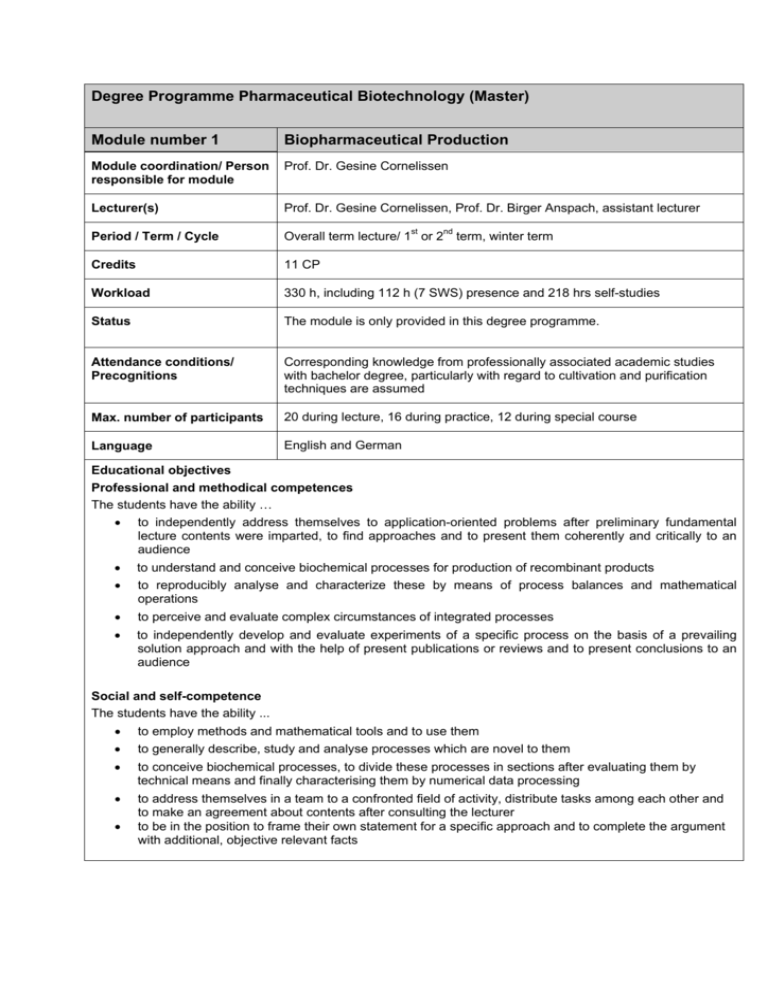
Degree Programme Pharmaceutical Biotechnology (Master) Module number 1 Biopharmaceutical Production Module coordination/ Person responsible for module Prof. Dr. Gesine Cornelissen Lecturer(s) Prof. Dr. Gesine Cornelissen, Prof. Dr. Birger Anspach, assistant lecturer Period / Term / Cycle Overall term lecture/ 1st or 2nd term, winter term Credits 11 CP Workload 330 h, including 112 h (7 SWS) presence and 218 hrs self-studies Status The module is only provided in this degree programme. Attendance conditions/ Precognitions Corresponding knowledge from professionally associated academic studies with bachelor degree, particularly with regard to cultivation and purification techniques are assumed Max. number of participants 20 during lecture, 16 during practice, 12 during special course Language English and German Educational objectives Professional and methodical competences The students have the ability … • to independently address themselves to application-oriented problems after preliminary fundamental lecture contents were imparted, to find approaches and to present them coherently and critically to an audience • to understand and conceive biochemical processes for production of recombinant products • to reproducibly analyse and characterize these by means of process balances and mathematical operations • to perceive and evaluate complex circumstances of integrated processes • to independently develop and evaluate experiments of a specific process on the basis of a prevailing solution approach and with the help of present publications or reviews and to present conclusions to an audience Social and self-competence The students have the ability ... • to employ methods and mathematical tools and to use them • to generally describe, study and analyse processes which are novel to them • to conceive biochemical processes, to divide these processes in sections after evaluating them by technical means and finally characterising them by numerical data processing • to address themselves in a team to a confronted field of activity, distribute tasks among each other and to make an agreement about contents after consulting the lecturer to be in the position to frame their own statement for a specific approach and to complete the argument with additional, objective relevant facts • Contents • bioprocesses with different host systems for the production of pharmaceutical products (intra and extra cellular) • Integrated bioprocess technology • Optimization of biochemical processes (Design of Experiments) • Disposable Biochemical Engineering • Aqueous 2-Phase-Partitioning, Expanded Bed Adsorption, Extractive Fermentation, Big Beads, Affinity Membranes, Magnetic Beads, Plasmid DNA Purification, Pervaporation Courses • Pharmaceutical Biochemical Engineering, 100% of module score • Pharmaceutical Biochemical Engineering Practice • Purification Techniques • Purification Techniques Special Course Teaching methods/ Forms of teaching media Presentation of pharmaceutical processes and their technical assembly with PowerPoint and attendant lecture notes Derivation of mathematical backgrounds on the black board Summary of results in work sheets The practical transfer in terms of case studies of real processes is carried out in a separately practice with the help of provided experimental data. Thereby processed problems will be finished as homework and then eventually rectified. The students have to independently elaborate sub problems and present them by use of PowerPoint and work sheets. Course achievements and performances Pharmaceutical Biochemical Engineering lecture and practice: one controlled written examination with performance record Integrated Purification Techniques: written examination with separation problems to be solved and specific questions IPT Special Course: participation certificate (course achievement) Literature/ Teaching aids /1/ G. Cornelissen: Lecture notes Pharmaceutical Biochemical Engineering /2/ G. Gellissen: Production of Recombinant Proteins. Novel Microbial and Eukaryotic Expression Systems, 2004. /3/ L. Eriksson: Design of Experiments. Umetrics Academy, Sweden, 2008. /4/ Stannbury and Whitaker: Principles of Fermentation Technology, Pergamon Press, 1986 /5/ P. M. Doran: Bioprocess Engineering Principles. Academic Press, London New York, 2007 /6/ B. Kristiansen: Integrated Design of a Fermentation Plant, VCH, 1994 /7/ Shuler and Kargi: Bioprocess Engineering, Prentice-Hall International Editions, 1992 /8/ Anspach: Lecture notes Integrated Purification Techniques /9/ PowerPoint presentations on E-Learning platform Moodle, including exercises Degree Programme Pharmaceutical Biotechnology (Master) Module number 2 Pharmaceutical Technology Module coordination/ Person responsible for module Prof. Dr. Birger Anspach Lecturer(s) Prof. Dr. Birger Anspach, Prof. Dr. Ernst A. Sanders, Prof. Dr. Claus Wacker Period / Term / Cycle entire Semester, 1st or 2nd term, winter term Credits 9 CP Workload 270 h, presence 96 h (6 SWS), self-study 174 h Status The module is provided only in this degree programme Attendance conditions/ Precognitions Appropriate knowledge from a professionally associated study programme with Bachelor degree Max. number of participants 20 in tutorial lectures Language English and German Educational objectives Professional and methodical competences The students have the ability … • to address themselves towards problems related to applied tasks after being introduced to a topic through basic lecture contents • to evaluate solution approaches and to present a critical and comprehensive conclusion in front of an audience • to understand the unique aspects of biopharmaceutical production in view of qualification of human resources, requirements to the production facility and process safety Social and self-competence The students have the ability … • • • • to address themselves to a setting of tasks in a team of students as well as to subdivide tasks and to make arrangements about task contents between students, thereby consulting the lecturer to formulate a statement on their own about a specific approach and to add relevant facts to the arguments to interpret the EU Guidelines to Good Manufacturing Practice - Medicinal Products for Human and Veterinary Use and to orientate own tasks towards these regulative guidelines to assume responsibility in a pharmaceutical facility Contents • • • • Quality management for the production of pharmaceuticals: human resources, operation, facility, documentation, quality safety Overview about important regularities: national, EU, USA/FDA, WHO Biologicals / Drugs / Drug Discovery, Drug Development, Clearance and Metabolism, Protein and Peptide Stability, Preformulation, Formulation, Drug Vehicles, Drug Conjugates Pharmacokinetics, Pharmacodynamics, Toxicity Studies, Preclinical Studies, Clinical Trials Courses • • • Pharmacology, 50% of module score Drug Development & Formulation, 50% of module score Good Manufacturing Practice Teaching methods/ Forms of teaching media Powerpoint presentations (also students to special topics) If possible, lectures are included from staff of pharmacy companies or excursions are organised to facilities Independent elaboration of chapters, i.e. of a site master file, as well as summaries in a group of two or individually about special problems Course achievements and performances Drug Development & Formulation: controlled written examination (Klausur) with performance record about case studies und problems Pharmacology: controlled written examination (Klausur) with performance record Good Manufacturing Practice: written examination about case studies Literature/ Teaching aids Anspach: Print-outs and PDFs of all presentations of the lecture E-Learning platform Moodle with all presentation from lecturers and students, including exercises Different specialised literature and publications as PDF for introduction in special themes and problems European Commission: EU Guidelines to Good Manufacturing Practice Medicinal Products for Human and Veterinary Use. 2005 and later PIC/S Secretariat (Eds.): Explanatory Notes for Industry on the Preparation of a Site Master File. 2004 U.S. Department of Health and Human Services: Guidance for Industry. Sterile Drug Products Produced by Aseptic Processing - Current Good Manufacturing Practice. 2004 Sanders E. A. Vorlesungsskript GMP Degree Programme Pharmaceutical Biotechnology (Master) Module number 3 Cell Culture Systems Module coordination/ Person responsible for module Prof. Dr. Oliver Ullrich Lecturer(s) Prof. Dr. Oliver Ullrich Period / Term / Cycle Lecture for complete term / 1. and 2. term / practical course during semester break of summer or winter term Credits 10 Workload 300 h, presence 112 h (7 SWS), self-study 188 h Status The module is only provided in this degree programme. Attendance conditions/ Precognitions Lecture Cell Culture Techniques is obligatory for attendance of Cell Culture Techniques Special Course Max. number of participants Max. 8 participants in Cell Culture Techniques Special Course Language English and German Educational objectives Professional and methodical competences Students have the ability to…. • • • understand the structure and function of eukaryotic cells at the levels of macromolecules and cell organelles. They know the significance of cell culture techniques for applications like protein expression, tissue engineering, primary cell culture, stem cell culture and cell-based bioassays (lecture Cell Culture Techniques) cultivate and subcultivate isolated cells under sterile conditions. They have the knowledge to select and use appropriate cell types for very different biotechnological applications. Students know sources of information for media and growth conditions in order to expand cells and keeping their cellular characteristics unchanged (Cell Culture Techniques Special Course) understand the large variety of prokaryotic and especially eukaryotic expression systems and how to make use of them. They can define the characteristics of various cell types and their corresponding vectors as well as strategies for cloning and expression (lecture Hosts and Expression Systems) Social and self-competence Students have the ability to…. • • • achieve educational objectives by teamwork as well as independently acquire the knowledge by creative learning / time management and to cope with stress work team-oriented and based on the division of labour as well as presenting and documenting the data scientifically Contents Lecture Cell Culture Techniques: introduction to cell biology: structure and cellular components of pro- and eukaryotic cells; microscopic methods; biosynthesis and transport of secretory proteins; cell motility and shape: microfilaments, microtubules and intermediate filaments; integration of cells in tissues; cell culture methods: design and equipment of a cell culture laboratory, cell culture containers, sterile techniques, contaminations, media and supplements, cultivation of cells, tissue and organ culture; applications: tissue engineering (cell therapy, tissue constructs, organ modules, stem cells, perfusion culture, quality control); mass cultivation in bioreactors for production of therapeutic and diagnostic proteins; transgenic animals and gene pharming; production of monoclonal antibodies; methods for isolation specific cell types; plant cell culture Cell Culture Techniques Special Course: baculovirus expression system: propagation, infection and harvest of Sf9 cells; colorimetric Trypan blue viability test; sodium dodecyl sulfate polyacrylamide gel electrophoresis (SDSPAGE) and western blot analysis to determine the expression rate; transfection of CHO cells with His6-GFPRab11: estimation of the transfection rate using the fluorescence microscope; immunofluorescence analysis of organelles in mammalian cells: seeding CHO cells; immunofluorescence analysis using organelle specific antibodies; effects of cytoskeleton binding drugs like nocodazole and taxol; primary culture of cardiomyocytes: preparation of heart tissue; mechanical dissociation and by trypsin; seeding and microscopic analysis of primary cells; toxicity test using animal cell culture replacing animal tests: testing dilution series of toxic reagents for determining cytotoxicity using neutral red uptake assay Lecture Hosts and Expression Systems: pros and cons of existing expression systems; comparison of costs, product yields and appropriate posttranslational modifications; selected examples taking in consideration vectors as well as strategies for cloning and expression: e.g. bacteria Escherichia coli, yeast Pichia pastoris, insect cells Spodoptera frugiperda and baculovirus, mammalian Chinese Hamster Ovary (CHO) cells, hybridoma cells, plant cells Courses • Cell Culture Techniques, 100% of module score • Cell Culture Techniques Special Course • Hosts and Expression Systems Teaching methods/ Forms of teaching media Seminaristic lectures with beamer presentation or using overhead projector; lecture scripts; practical course in groups of two students, script Course achievements and performances Lecture: written examination; practical course: final report Literature/ Teaching aids Lectures Cell Culture Techniques and Hosts and Expression Systems: “Molecular Cell Biology”, Harvey Lodish, Arnold Berk, Chris A. Kaiser, Monty Krieger, Matthew P. Scott, Anthony Bretscher, 6th ed., 2007, Verlag Palgrave Macmillan „Zell- und Gewebekultur“, Toni Lindl, Gerhard Gstraunthaler, 6th ed. 2008, Spektrum Akademischer Verlag, Heidelberg "Culture of Animal Cells", R. Ian Freshney. 5th ed. 2005, Wiley & Sons „Tissue Engineering: Essentials for Daily Laboratory Work: From Cell Biology to Artificial Organs“, W. W. Minuth, R. Strehl, K. Schumacher, 1. ed. 2005, Wiley-VCH „Gentechnik. Biotechnik“, T. Dingermann, 1999, Wissenschaftliche Verlagsgesellschaft Cell Culture Techniques Special Course: Script for practical course Degree Programme Pharmaceutical Biotechnology (Master) Module number 4 Bioanalytics Module coordination/ Person responsible for module Prof. Dr. Birger Anspach Lecturer(s) Prof. Dr. Olaf Elsholz, Prof. Dr. Susanne Töfke, Prof. Dr. Matthias Kalbas, Prof. Dr. Susanne Heise, Prof. Dr. Gesine Witt Period / Term / Cycle Overall term lecture/ 1st or 2nd term, summer or winter term Credits 9 CP Workload 270 h, presence 72 h (6 SWS), self-study 198 h Status The module is only provided in this degree programme. Attendance conditions/ Precognitions The successful completion of a module in "Instrumental Analysis" in a Bachelor programme is recommended. Max. number of participants 30 Language English and German Educational objectives Professional and methodical competences The students have the ability ... • • • • • • • • • • to evaluate qualitative and quantitative characteristics of a sample, especially considering accuracy, plausibility and traceability to evaluate and classify analytical problems and to independently elaborate approaches in view of quality assurance to effectively automate wet-chemical analytical methods especially for off-line and at-line analytics as well as to adequately employ chemo- and biosensors to employ biochemical analytical methods for the search about new active pharmaceutical ingredients and to define measuring parameters particularly with regard to quality assurance to introduce bioinformatics as a tool to ascertain proteins and polynucleotides to apply in vitro bioassays in the various phases of drug development on a reasonable basis to apply bioassays with special microorganisms (i.e. using Caenorhabditis elegans) to determine drug absorption and availability to differentiate various detections techniques concerning accuracy and sensitivity and to employ these accordingly to evaluate potential targets to differentiate advantages and disadvantages of high throughput screening methods and high content screening methods for drug discovery Social and self-competence After successful completion of the module, students will have the ability to evaluate, independently or in a team, a strategy concerning a specific analytic problem. In projects, i.e. the lab project, they are able to distribute work about themselves and to consolidate results in a meaningful manner. They are able to identify meaningful methods in view of a specific analytical problem and to substantiate the significance of the results. The will learn to critically reflect their own results – in view of the data itself as well as the evidence of the method employed – and to defend the conclusion in front of an audience. Contents The module communicates basic knowledge to gain quantitative analytical characteristics of a sample and to substantiate qualitative analytical characteristics as well as special knowledge in view of novel analytical techniques to find and to confirm the biological activity of new drug: • • • • • • • • • • Analytical characteristics (detection limit, limit of quantisation) Evaluation of strategies (applications in the field of soil, water, air and bioreactor analytices with special consideration of the sampling technique Special biochemical analysis techniques (ELISA, RIA, sequence and structure analysis, proteomics, bioinformatics, ...) Chemo- and biosensors Off-line und at-line analytics as well automation (partition coefficient, FIA, dispersion coefficient, comparison of CFA / FIA / SIA, apparatus (pumping systems, injection systems, tubings, manifolds, detectors), application examples of FIA, SIA, MSFIA) Preclinical and clinical research under GLP / GMP (new biological entities, biosimilars, biomarkers) Functional assays for the determination of biological activity In vitro assays (cell-based and without cells) Detection methods (radioactivity, fluorescence, luminescence, label-free detection In vivo Imaging Courses • • • Off-line and At-line Analytics, 50% of module score Biochemical Analysis, 50% of module score Bioassays Teaching methods/ Forms of teaching media Seminaristic Lectures, presentations with Powerpoint, short presentations of students, reports and group work about specific problems as well as concepts about new developments, short video sequences Course achievements and performances Written examinations Literature/ Teaching aids Current editions of: Harris, Lehrbuch der quantitativen Analyse Harris, Quantitative Chemical Analysis K. Cammann, Instrumentelle Analytik Trojanowicz, Flow Injection Analysis Kurzskript und Arbeitsblätter zu den Vorlesungen sowie zahlreiche methodenspezifische Handbücher und Fachartikel (überwiegend in Englisch) Gey, Instrumentelle Analytik und Bioanalytik Alberts, Molecular Biology of the Cell Choudary, Bioassay Techniques for Drug Development Lottspeich/Engels, Bioanalytik Degree Programme Pharmaceutical Biotechnology (Master) Module number 5 Bioprocess Automation Module coordination/ Person responsible for module Prof. Dr.-Ing. Reiner Luttmann Lectures Prof. Dr.-Ing. Reiner Luttmann, Dipl.-Ing. Ulrich Scheffler Period / Term / Cycle entire Semester, 1st or 2nd term, summer term Credits 7 CP Workload 210 h, presence 80 h (5 SWS), self-study 130 h Status The module is only provided in this degree programme Attendance conditions/ Precognitions Knowledge in Basics of Electrical Engineering Measuring Techniques, Automatic Control, Heat and Mass transfer, Bioreactor and Fermentation Technology are precondition Max. number of participants 20 in tutorial lectures, 8 in special courses Language English and German Educational objectives Professional and methodical competences The students have the ability … • to understand basic functions of bioreactors • to evaluate classical measurement techniques and extended atline analysis system • to describe exclusive functional units and control loops of bioreactors based on energy and mass balances • to transform mathematical system approaches in normalized control theory form • to benchmark dynamic behavior of bioprocess control loops and to find appropriate control parameters • to develop open-loop and closed-loop control procedures for media components and cell physiological parameters Social and self-competence The students have the ability … • to evaluate the automation functionality of bioreactors and to complete available equipment meaningfully • to describe mathematically functionalities of bioreaction processes and to adapt bioreactor control parameters appropriately • to scrutinize controlled fed batch processes and to configure the essential instrumental engineering Contents • Automation structures of bioreactors • Classical inline- and online-measuring techniques at the bioreactor such as temperature, pH, pO2, etc. • Extended physical and (bio)chemical analysis for atline measurement of cell density, substrates and products • Commercial available data acquisition- and data processing systems for bioreactors • System theoretical description of functional units (aeration, agitation, mass transfer, off gas, feed and harvest) as well as exclusive control loops (temperature, pH, pO2 and level) • Development of adaptive pO2/feed- and pO2/agitation control • Development of control procedures for cell specific growth rate Courses • Bioprocess Automation 1st or 2nd term, 100% of module score • Bioprocess Automation Special Course 1st or 2nd term Teaching methods/ Forms of teaching media Course achievements and performances • Presentation of practical applications and technical details with PowerPoint and attendant lecture notes • Derivation of mathematical background at the panel • Deepening of knowledge with accompanying tutorials and mathematical exercises • Experimental work for determination of mass transfer and reaction parameters as well as for continuous culture level control and temperature control • Independent preparation of intermediate and final reports of investigated experiments The course will be finished with a controlled written examination with performance record and is accompanied by intermediate check-ups of knowledge. For participation of the special course check-ups of the theoretical background must be completed. A successful attendance is to be demonstrated by protocols and a colloquium in a timely manner. Literature/ Teaching aids /10/ P. F. Stanbury, A. Whitaker and S. J. Hall: Principles of Fermentation Technology, Pergamon Press, Oxford New York, 1999 /11/ K. G. Carr-Brion: Measurement and Control in Bioprocessing, Elsevier Applied Science, London and New York, 1991 /12/ M.-N. Pons: Bioprocess Monitoring and Control, Hanser Publishers, Munich Viena New York, 1991 /13/ G. Stephanopoulos: Chemical Process Control - An Introduction to Theory and Practice, Prentice Hall International Editions, 1984 /14/ B. A. Ogunnaike, W. H. Ray: Process Dynamics, Modeling and Control, Oxford University Press, New York Oxford, 1994 /15/ R. Luttmann: Lectures notes Introduction to system theory and control engineering /16/ R. Luttmann: Lectures notes Selective chapters of Bioprocess Automation /17/ R. Luttmann und U. Scheffler: Theoretical elaboration and experimental guidance for the special course Bioprocess Automation Degree Programme Pharmaceutical Biotechnology (Master) Module number 6 Process Simulation Module coordination/ Person responsible for module Prof. Dr.-Ing. Reiner Luttmann Lectures Prof. Dr.-Ing. Reiner Luttmann and co-workers Period / Term / Cycle entire Semester, 1st or 2nd term, summer term Credits 7 CP Workload 210 h, presence 64 h (4 SWS), self-study 146 h Status The module is provided only in this degree programme Attendance conditions/ Precognitions Basic knowledge in Measuring Techniques, Automatic Control, Heat and Mass transfer, Upstream and Downstream Process Engineering, Matrix Algebra and solving differential equations Max. number of participants 16 in tutorial lectures and practice Language English and German Educational objectives Professional and methodical competences The students have the ability … • to develop mathematical models of dynamical processes in biochemical engineering, based on mass and energy balances, on mass transfer correlations and reaction kinetics approaches • to use this models for determination of global process parameters with numerical procedures and least square methods • to simulate the dynamic equations using MATLAB • to identify unknown parameters by fitting simulation results to experimental data with heuristic optimization procedures Social and self-competence The students have the ability … • to apply methods and mathematical tools which allow them • to simulate and proof mathematical models found in literature • to describe own experimental results with given models or • to change given models for a better description of own problems • to design biochemical process strategies and test these ideas with simulation • to analyze biochemical processes by use of numerical mathematical tools Contents • Description of dynamic processes and system approaches, mass and energy balances, mass transfer and reaction kinetics • Systems with lumped parameters and distributed parameters • Linear and non linear systems • Introduction in MATLAB • Numerical differentiation and integration • Stationary and dynamic processes • Least square and parameter identification • Applications in Biochemical Engineering o growth processes o inducible reaction process o production of recombinant proteins o high cell density process Courses • Analysis, Modeling and Simulation of Bioprocesses, 100% of module score • Analysis, Modeling and Simulation of Bioprocesses Practice Teaching methods/ Forms of teaching media • • • Presentation of technical details, practical applications and mathematical background with PowerPoint and attended lecture notes Derivation of mathematical background at the panel Computer exercises with practical applications of simulation and numerical analysis of real processes were carried out with real experimental data Course achievements and performances The courses will be finished with one controlled examination with performance record and are accompanied by an intermediate check up of knowledge Literature/ Teaching aids /18/ R. Luttmann: Lecture note Analysis, Modeling and Simulation of Bioprocesses /19/ R. Luttmann: Lecture note Advanced Biochemical Engineering /20/ Mathworks: MATLAB® - The language of Technical Computing. Prentice Hall, New York 1997 /21/ G. Lindfield and J. Penny: Numerical Methods Using MATLAB®. Elis Horwood, London Toronto, 2000 /22/ S Adam: MATLAB® und Mathematik kompetent einsetzen. Wiley-VCH, Weinheim, 2006 /23/ J. Kahlert: Simulation technischer Systeme. Vieweg Wiesbaden, 2004 /24/ I. J. Dunn, E. Heinzle, J. Ingham, J. E. Prenosil: Biological Reaction Engineering – Dynamic Modelling Fundamentals with Simulation Examples, Wiley-VCH, 2003 /25/ Bioreaction Engineering Modeling and Control (Eds. K. Schügerl, K. H. Bellgardt), Springer, Berlin, Heidelberg, New York, 2000 /26/ P. Arbenz: Kurze Einführung in MATLAB1, Institut für Computational Science, ETH Zürich, November 2005/Januar 2006 http://people.inf.ethz.ch/arbenz/MatlabKurs/matlabintro.pdf /27/ L. K. Nielsen, R. B. Newell, I. T. Cameron, T. Howes: MATLAB PROGRAMMING, A Primer for the Process Engineer, Department of Chemical Engineering, The University of Queensland, 2001 http://www.nt.ntnu.no/users/thz/matlab/Quensland_matlab_tutorial.pdf /28/ L. Voges: Skript zur Vorlesung/Übung Modellierung von Bioprozessen des Lehrstuhls für Bioprozesstechnik der Otto-von-GuerickeUniversität Magdeburg (Fakultät für Verfahrens- und Systemtechnik, Institut für Verfahrenstechnik), 2008 http://www-ian.math.unimagdeburg.de/home/risch/NUM2005/Einfuehrung_in_MATLAB.doc Degree Programme Pharmaceutical Biotechnology (Master) Module number 7 Biotechnological Research Module coordination/ Person responsible for module Prof. Dr. Ernst A. Sanders Lecterur(s) All Professors of the department biotechnology Period / Term / Cycle distributed through the term or in a compact time frame / 1st or 2nd term / summer or winter term Credits 7 CP Workload 210 h Status Attendance conditions/ Precognitions Appropriate knowledge from a professionally associated study programme with Bachelor degree Max. number of participants Small groups in projects, about 20 at the seminar Language English and German Educational objectives Professional and methodical competences Students have the ability to…. • understand even complex tasks in the frame of experimental plants, set-ups, instructions and data and to transfer these information to their own lab project • work with literature data bases, to obtain current qualified technical literature, to critically interpret and incorporate additional facts into their own projects • to independently plan laboratory experiments inclusively procurement of materials, to accomplish and to interpret these experiments. Social and self-competence Students have the ability to … • • to handle their projects with responsibility, cost-consciously, and with a high degree of autonomy to contact experts it necessary, to discuss experimental designs and additional technical preparations with colleagues and the project manager and to defend these preparations against critical arguments Contents • The contents are dependent on the choice of projects and cannot be named globally. Tasks from all areas of biotechnology are conceivable. Courses • • Lab Project, 6 CP, 100% of module score Research Seminar, 1 CP Teaching methods/ Forms of teaching media Typically an experimental task is bound to the lab project, which is prepared in any laboratory at the faculty Life Sciences of the HAW Hamburg. The project report is typically completed with technically and project oriented as well as office software. Course achievements and performances The project is completed with a score (oral presentation and/or project report), the seminar by attending at least 80% of the seminar dates offered in one year. Literature/ Teaching aids Up to date technical literature Degree Programme Pharmaceutical Biotechnology (Master) Module number 8 Master- Thesis Module coordination/ Person responsible for module Prof. Dr. Birger Anspach Lecturer(s) All Professors of the Department Biotechnologie Period / Term / Cycle Complete term / 3. term / summer or winter term Credits 30 Workload 900 h Status Attendance conditions/ Precognitions 50% completion of courses of the master programme (240 CP from the master and previous studies are attained) Max. number of participants -- Language English and German Educational objectives Professional and methodical competences Students have the ability to…. • • • • • analyse and systemise complex engineering and scientific tasks in biotechnology and neighbouring disciplines, based on a deepened methodological expertise as placed in the master programme and also to define their own relevant tasks familiarise themselves with the state of scientific and technical knowledge of a specific task utilizing learnt knowledge as well as national and international technical literature and databases in case of an experimentally orientated task: to familiarise themselves with the scientific and technical basics of the technical requirements of experiments, to elaborate a reasonable programme of succeeding experiments, to accomplish these experiments, to critically appraise the results on the basis of theoretical knowledge, and further to elaborate follow-up tasks in case of a theoretically orientated task: to critically discuss the state of scientific and technical knowledge from literature and to compare with learnt fundamentals, to find conjunctions between similar fields of knowledge, and to elaborate conclusions and directives to complete a task in a preset time frame by means of an efficient problem-oriented workflow, to critically scrutinise the task and to elaborate follow-up tasks Social and self-competence Students have the ability to…. • • • • act independently in a team solving a scientific task, thereby organising the team when indicated, and delegating subtasks in case of complex projects guide and coordinate a team working on a specific task, to identify conflicting tasks and to raise a professional solution identify and define relevant interfaces in interdisciplinary projects conclude results of a project in a scientific report and to present these results in front of an audience Contents Specific tasks of actual research projects in working groups of the faculty life science or companies working in the field of biotechnology or neighbouring disciplines. Courses • Master- Thesis Teaching methods/ Forms of teaching media Individual discussions between mentoring professor and student by means of reports and experimental results Discussions in presentations of intermediate or final results Course achievements and performances Final report (Master – Thesis) with performance record based on a numerical grading scale Literature/ Teaching aids Necessary teaching aids depend on the research subject.
